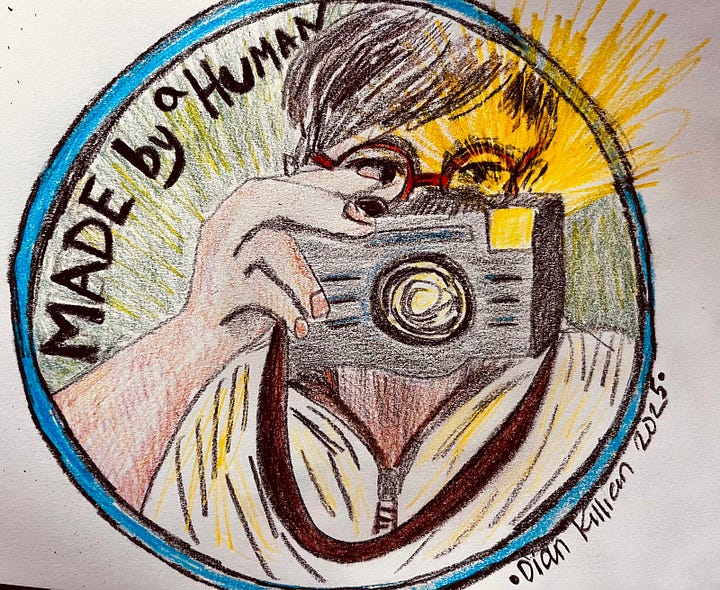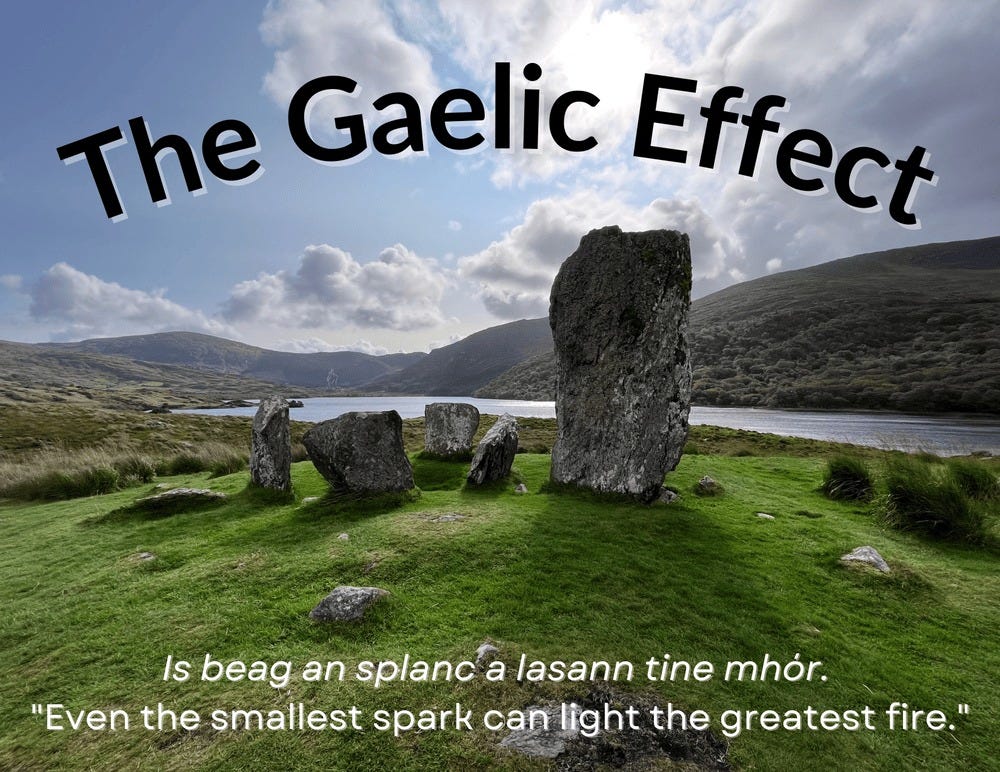Fáilte! (Welcome!)
GAEL-Stack is out! If you missed it, on St. Paddy’s Day The Gaelic Effect published its curated list of 100+ publications on Substack that focus on Ireland and Irish culture. Féach anseo é (see it here).
Agus míle buíochas arís (a thousand thanks again) to all my subscribers and especially paid subscribers. Tá miongháire orm mar gheall oraibh. (You bring a smile on my face.) Your feedback, appreciation and support keep me going!
Friendly reminder to check out the hyperlinks in the essay below. They take you to citations, more indeph reading, and pronunciation of Irish words.
Enjoy! And now, for this week’s Gaelic Effect…
Profuse feelings
This week, two different comments from subscribers got my attention: one, that Irish seems more connected to feelings than English. I agree—and feelings as Gaeilge are expressed more profusely too. Two common examples: “Thank you very much” is go raibh míle maith agat (“a thousand good things to you”); the míle (the thousands) are often even multiplied: míle, míle maith agat! Again, rather than just “welcome” (fáilte), it’s more common to say, Céad míle fáilte, a “hundred thousand welcomes.” This exuberance could just be idiomatic. Yet as seen recently in Close to the Bone, Irish curses—traditionally used more than profanity, are also profuse (not one devil at you, but seven!) as is expressing affection in Irish (see The Body Sings Electric). Another reader commented that there seems to be more expressions in Irish to do with presence and being true to/with oneself (found in Hiberno-English now as well, such as “he is himself”). I agree and would extend this to a high value in Irish on equnimity and peace of mind (see again Close to the Bone).
Today I want to explore a common phrase in Irish that is profound in how it expresses feelings and a quality of presence.
A sorry state
In English, “sorry” looks similar to “sorrow” but actually comes from Old English sāriġ (feeling sorry, grieved, sad, mournful or bitter or expressing grief) and ultimately from the West German word for “sore.” (You can still hear this in the pronunciation: “sore” + y = sorry.) Today, “sorry” can still express sadness and mourning (“I am sorry for your loss"). Yet often it can mean just “excuse me” (“Sorry I stepped on your toes”); pittiful (“After the storm, the garden was in sorry state”); or pathetic (“Bob is a sorry excuse for a football player”). It can also mean “excuse me” (as in, “Sorry, coming through!) or self-correction (“Sorry, I meant two, not three”). (Wiki) Perhaps these other uses have muddled the original meaning. When used to express actual regret (“I’m sorry I hurt your feelings”), it doesn’t express much deph of feeling. It comes across more as a place holder, a perfunctory formality.
Consistent with this, in Nonviolent Communication (NVC), “sorry” is not even considered a feeling. It doesn’t appear on the feelings list, a comprehensive, two page inventory of feeling-words used as a reference in practicing NVC. More, Marshall Rosenberg, the creator of NVC, actually saw “sorry” as inconsistent with the consciousness and practice of NVC. His focus was on how people could meet their needs in mutually satisfying ways, free of pressure, guilt, or shame. For him, “sorry” often comes loaded with moral judgment—both when we say “sorry” and expect (or demand) an apology from others. In the video below, he illustrates this concept via a brief roleplay, showcasing how this language often can turn up between parents and children (and of course others):
If not used moralistically—often expressing in this case self-recrimination, “sorry” at best is often a throw-away phrase. As Marshall also comments in the video, using “sorry” in this way is a strategy to buy forgiveness—or to move on quickly from an uncomfortable moment (“OK, sorry…!”). If we have said or done something that we wish we hadn’t—that’s lacking integrity with our own needs for awareness, care or respect—then we probably are feeling something in rhe range of regret or sad or heavy-hearted. In English, “sorry” was once connected to these genuine feelings; as we saw in the etymology, it originally meant to be literaly “sore” with sadness. That meaning is now lost.
An ní nach bhfeiceann súil ní bhrónann croí. (What the eye doesn’t see, the heart rues not.)
True feeling
What’s compelling for me again is how consistent the Irish language is with Nonviolent Communication and, when you translate an Irish expression into English, how much is often lost; the English version (the only or closest translation available) simply lacks the same complexity or nuance of what’s expressed in the original Irish.
In Irish, “I’m sorry” is tá brón orm, literally “I have sadness or sorrow on me.” The word for sorrow and sadness, brón, is the exact same in Old Irish; in effect, this word and its meaning has gone unchanged (and undiluted) for nearly 3,000 years. In Be Here Meow, I write about how in Irish, most feelings are “on” you rather than defining you (via a linking verb) as in English (“I am sad”). From a psychological perspective, this is a healthier way to relate to feelings: acknowledging yet not over identifying with them. Marshall talked about this concept as well: that you don’t want to get “stuck” in your feelings—they are a way to self-connect and identify your needs. When feelings are “on” you—as they are in Irish, they are temporary states, like putting on a hat or clothes. This temporary state of feelings also brings us into the present moment. Again, this parallels NVC where you usually ask, “How are you feeling?” (using the present continusous tense) rather than the habitual or static (simple present), “Do you feel __?” We want the connection of knowing specifically how you are now, in this moment. In Irish, feelings being “on” you brings us into this “be here now” super-present awareness.
Tá brón orm has all these aspects (with the sadness “on” you). It is also, of course, a genuine expression of regret. The sadness and sorrow is not hidden or buried in the etymology as in the English “sorry;” it’s still on the surface, in every day use: “I’m sad” (for whatver words or actions taken, that you now regret). I encourage you to try both. Imagine someone doing or saying something hurtful or disappointing for you; imagine hearing in response, “I’m sorry.” Now imagine hearing instead, “I’m sad” or even, “I’ve sadness on me” (about what was said/done). For me, hearing about the sadness that’s “on” you (tá brón orm) is much more vulnerable, real and connecting. Perhaps because the sadness or sorrow is on you, I especially feel that it’s “felt”—that the speaker is aware (and fully taking in/on) the impact of their actions.
Lost treasures
For me it’s a sad story—is scéal brónach é, how much has been lost (or is simply missing) in the English language. It’s sad not only because Bearla (English language) expressions can often lack depth, lyricism and beauty; I believe the differences (and even deficits) in meaning have real impact. There are aspects of course about English that I admire and enjoy; it is my mother tongue. Yet as English continues to dominant the world and more and more endangered languages disappear from our collective human family, what are we missing and losing? It is a loss not just of idiomatic expression. As the Irish language shows us, it’s a loss of an often radically different way of seeing and experiencing the world.
With heart-felt appreciation for your being on this journey with me and hoping you have no regrets—at least today,
Dian, i mBaile Atha Cliath (in Dublin)
You can also support The Gaelic Effect and its mission by making a one-time donation by clicking anseo (here).









I do wonder if there is any other language as "muddy" as English. The etymologies tend to be so shrouded in mysteries. German doesn't seem to really have this problem to the same extent, I can't say for other languages.
I watched the video and read your text and my mind expanded. At 43 years of age, I'm reconnecting with an undeveloped part of my emotional side that I didn't know was there. There was no room for emotions growing up: it wasn't even in the language I learned from a young age. I catch myself now rephrasing my inner dialogue from "I am <unhappy|sad|anxious" to I "feel ..." in Dutch. Maybe that's why I have huge difficulties trying to even start learning Irish, it feels so utterly foreign, but I feel amazed reading snippets. Just don't know how to pronounce it either haha!